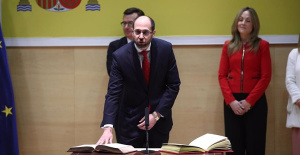The PP attacks Sumar's initiative and says it seeks to "give impunity to hate"
MADRID, 19 Dic. (EUROPA PRESS) -
The Socialist Group has opened this Tuesday in Congress to "open a calm and moderate debate" to reform the Penal Code and decriminalize insults to the Crown and the glorification of terrorism, which is why it gives the green light to the bill promoted by Sumar and that seeks to suppress the so-called crimes of opinion, which also include offenses to religious feelings and outrages to national symbols.
In her turn to position, the socialist deputy Isaura Leal has pointed out that the legislator "cannot and should not ignore the resolutions of international organizations" that have condemned Spain in relation to the protection of freedom of expression. For this reason, she has been in favor of "opening a calm debate to reach a consensus on the necessary reforms" that accompany "the evolutionary criteria that the courts themselves must adapt to the new times in their application."
Leal explained that the reform must be based on consensus and move away from "maximalist or extremist positions" and has indicated that it is essential for this for the PP to "move away from the extreme right."
But in his turn, the representative of the Popular Group in Congress Sergio Sayas has harshly attacked the legislative initiative defended by the deputy of Sumar Enrique Santiago, pointing out that they bring it because they want to "give impunity to hatred" since freedom of expression "is guaranteed in the Constitution". "I recommend that you and the PSOE read the Constitution more and trample on it less," he said, adding that the problem with democracy is the Government that "is dedicated to eroding and demolishing it."
In this sense, he pointed out that the crimes currently included in the Penal Code are not an exception in Europe, as the proposing group maintains, and he gave Germany as an example. In this he has agreed with the Vox parliamentary group, which has even advocated toughening the Penal Code in this regard.
Sayas has gone further and commented that the Penal Code regarding freedom of expression is not an exception, but it is "having a Government with communists in it, supported by a fugitive - by the former Catalan president Carles Puigdemont - and sustained "by those who dealt a blow to the Constitution." "They do not come to defend freedom of expression but to destroy constitutional Spain," he highlighted.
In line, he has accused the PSOE of perpetrating an "attack on the Constitution" from the Government and has maintained that "the main threat to Democracy is the President of the Government, Pedro Sánchez."
Leal (PSOE) in turn has indicated that although they will vote in favor of the Sumar initiative, with which they share a coalition government, they will make contributions to it, pointing out that they cannot fail to protect "the dignity and respect of the institutions of the rule of law" and that there must be institutional protection for the victims of terrorism.
At this point, he clarified that it is the obligation of the State "to pursue the perpetrators of the crime of glorifying terrorism, and to protect the victims." "Protection of victims must prevail over those who belittle or humiliate," she added and then explained that the limit is that words "can never incite hatred that leads to violence."
For his part, Vox deputy José María Figaredo has also attacked Sumar's initiative, pointing out that what he seeks is not more freedom of expression but rather "the law of the funnel" to "gag and kneel the opposition."
In his opinion, this initiative dresses Spain as "a kind of totalitarian state that represses" when in reality "it is one of the democracies that least defends its symbols in Europe." For this reason, he has indicated that this drift should be reversed and the harshness of the Penal Code should be delved into.
"The reality is that in Spain we rarely punish those who insult and subvert public order," he explained and then added that both Sumar and the PSOE are working "to carry out a coup d'état from the Government, from La Moncloa."
For his part, Sumar deputy Enrique Santiago has pointed out in his defense of the proposition that the current situation regarding penalties related to freedom of expression is a "democratic anomaly" derived from a reform promoted by the PP. For this reason, he has stressed that the PSOE must help carry out this reform "to return to the existing situation with the Government of José Luis Rodríguez Zapatero and for Spain" to be placed in a scenario of defense of the right to freedom of expression ".
Both the PNV and EH Bildu have been in favor of taking the proposal into consideration. Mikel Legarda (PNV) has highlighted that it is necessary to study specifically how the right to freedom of expression confronts the different types of criminal offenses on which both the European Court of Human Rights (ECtHR) and the UN and different NGOs have spoken out. alarm for imbalances.
Of course, the PNV has advocated that the debate include an in-depth technical legal examination, which is why it has advocated collecting reports from the Criminal Section of the Codification Commission.
Jon Iñarritu (EH Bildu) has also referred to the rulings against Spain in this matter in the ECtHR and has pointed out that "the duties have to be done" so Sumar's proposal will serve to ensure that democratic standards are met with guarantees. .
Along the way, he stressed that being "from another era" such as there being rappers in exile --by Valtonyc-- or imprisoned --by Pablo Hassel-- "they should not be seen in a democratic or advanced state."
The ERC deputy Pilar Vallugera, who has advanced the vote in favor, has asked in her turn that PSOE and Sumar not leave the initiative "dormant in a drawer" and has indicated that this reform, together with the repeal of the one known as ' gag law' could prevent "self-censorship in society."
"The higher the institution, the more subject to the capacity for criticism (it should be). The more undemocratic an institution like the Monarchy is, the more criticism we must be able to exercise," he stated.
Already in the Mixed Group's turn, Podemos deputy Martina Velarde recalled that there is no full democracy "if you can end up in jail for rapping" or for insulting the Crown.
"We are going to support the initiative because we have defended it since 2018, because they are archaic and obsolete crimes. But it is insufficient, the gag law must also be repealed to close the circle," he added.
Nestor Rego (BNG) has held the same opinion, and he has criticized the fact that issues such as insults to the Cortes and general insults are left out. He has also regretted that with regard to offenses against religion, the proposal remains "half-way." "To reverse it, we must carry out a more in-depth reform and repeal the gag law, which has not been done so far," he added.
This proposal, which seeks to reform the Penal Code with the aim of eliminating the so-called crimes of opinion, among which are insults to the Crown, offenses to religious feelings and outrages to national symbols, also proposes eliminating the crime of glorification of terrorism to avoid sentences for singers and artists, and replace it with an aggravating circumstance in the article that guides treachery in the face of humiliation or humiliation of victims, with the aim of giving them reinforced protection coverage.
This was the first law registered by Sumar in this legislature and has its origins in the one that Unidas Podemos already presented in the previous one. The Congress came to take it into consideration but in the end the reform was not carried out due to the continuous extension of the deadline for the presentation of amendments, despite the fact that the PSOE and Unidas Podemos had a majority on the Chamber Table.

 Exploring Cardano: Inner Workings and Advantages of this Cryptocurrency
Exploring Cardano: Inner Workings and Advantages of this Cryptocurrency Seville.- Economy.- Innova.- STSA inaugurates its new painting and sealing hangar in San Pablo, for 18 million
Seville.- Economy.- Innova.- STSA inaugurates its new painting and sealing hangar in San Pablo, for 18 million Innova.- More than 300 volunteers join the Andalucía Compromiso Digital network in one month to facilitate access to ICT
Innova.- More than 300 volunteers join the Andalucía Compromiso Digital network in one month to facilitate access to ICT Innova.-AMP.- Ayesa acquires 51% of Sadiel, which will create new technological engineering products and expand markets
Innova.-AMP.- Ayesa acquires 51% of Sadiel, which will create new technological engineering products and expand markets AstraZeneca admits that its Covid vaccine can cause side effects such as thrombosis in "very rare cases"
AstraZeneca admits that its Covid vaccine can cause side effects such as thrombosis in "very rare cases" The PP signs the director of the cabinet of the governor of the Bank of Spain for its list for the European elections
The PP signs the director of the cabinet of the governor of the Bank of Spain for its list for the European elections Illa does not rule out agreeing with Junts after the Catalans if they do not prioritize independence
Illa does not rule out agreeing with Junts after the Catalans if they do not prioritize independence Los Angeles Police begin to dismantle the encampment at the University of California
Los Angeles Police begin to dismantle the encampment at the University of California How Blockchain in being used to shape the future
How Blockchain in being used to shape the future Not just BTC and ETH: Here Are Some More Interesting Coins Worth Focusing on
Not just BTC and ETH: Here Are Some More Interesting Coins Worth Focusing on UPV students design an app that helps improve the ventilation of homes in the face of high temperatures
UPV students design an app that helps improve the ventilation of homes in the face of high temperatures Ivace and promotes a less invasive device for the early detection of prostate cancer
Ivace and promotes a less invasive device for the early detection of prostate cancer Valencia unanimously approves the ordinance to allocate spaces to test innovative initiatives
Valencia unanimously approves the ordinance to allocate spaces to test innovative initiatives UPV researchers promote a paid master's degree as a "talent factory" in integrated photonics
UPV researchers promote a paid master's degree as a "talent factory" in integrated photonics A million people demonstrate in France against Macron's pension reform
A million people demonstrate in France against Macron's pension reform Russia launches several missiles against "critical infrastructure" in the city of Zaporizhia
Russia launches several missiles against "critical infrastructure" in the city of Zaporizhia A "procession" remembers the dead of the Calabria shipwreck as bodies continue to wash up on the shore
A "procession" remembers the dead of the Calabria shipwreck as bodies continue to wash up on the shore Prison sentences handed down for three prominent Hong Kong pro-democracy activists
Prison sentences handed down for three prominent Hong Kong pro-democracy activists ETH continues to leave trading platforms, Ethereum balance on exchanges lowest in 3 years
ETH continues to leave trading platforms, Ethereum balance on exchanges lowest in 3 years Investors invest $450 million in Consensys, Ethereum incubator now valued at $7 billion
Investors invest $450 million in Consensys, Ethereum incubator now valued at $7 billion Alchemy Integrates Ethereum L2 Product Starknet to Enhance Web3 Scalability at a Price 100x Lower Than L1 Fees
Alchemy Integrates Ethereum L2 Product Starknet to Enhance Web3 Scalability at a Price 100x Lower Than L1 Fees Mining Report: Bitcoin's Electricity Consumption Declines by 25% in Q1 2022
Mining Report: Bitcoin's Electricity Consumption Declines by 25% in Q1 2022 Oil-to-Bitcoin Mining Firm Crusoe Energy Systems Raised $505 Million
Oil-to-Bitcoin Mining Firm Crusoe Energy Systems Raised $505 Million Microbt reveals the latest Bitcoin mining rigs -- Machines produce up to 126 TH/s with custom 5nm chip design
Microbt reveals the latest Bitcoin mining rigs -- Machines produce up to 126 TH/s with custom 5nm chip design Bitcoin's Mining Difficulty Hits a Lifetime High, With More Than 90% of BTC Supply Issued
Bitcoin's Mining Difficulty Hits a Lifetime High, With More Than 90% of BTC Supply Issued The Biggest Movers are Near, EOS, and RUNE during Friday's Selloff
The Biggest Movers are Near, EOS, and RUNE during Friday's Selloff Global Markets Spooked by a Hawkish Fed and Covid, Stocks and Crypto Gain After Musk Buys Twitter
Global Markets Spooked by a Hawkish Fed and Covid, Stocks and Crypto Gain After Musk Buys Twitter Bitso to offset carbon emissions from the Trading Platform's ERC20, ETH, and BTC Transactions
Bitso to offset carbon emissions from the Trading Platform's ERC20, ETH, and BTC Transactions Draftkings Announces 2022 College Hoops NFT Selection for March Madness
Draftkings Announces 2022 College Hoops NFT Selection for March Madness























